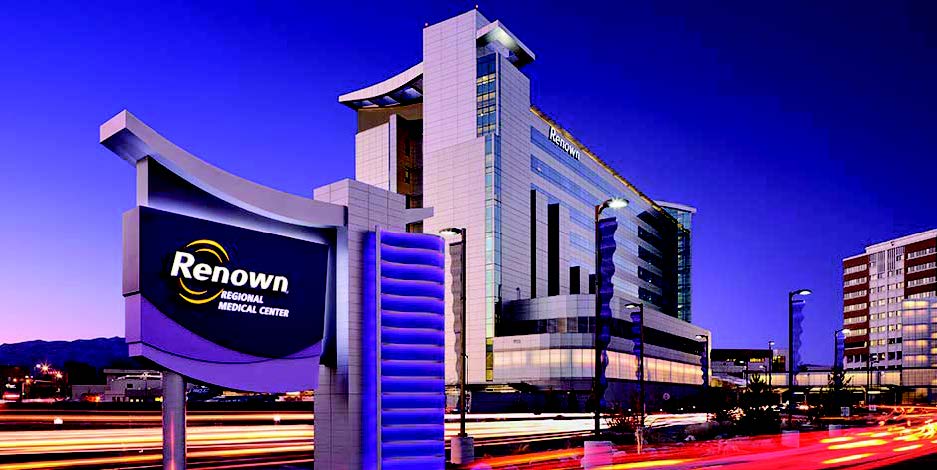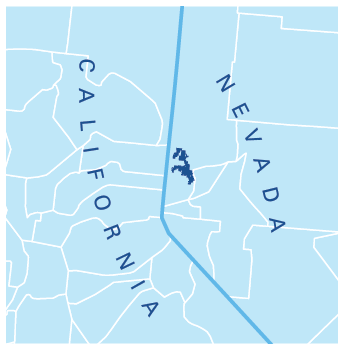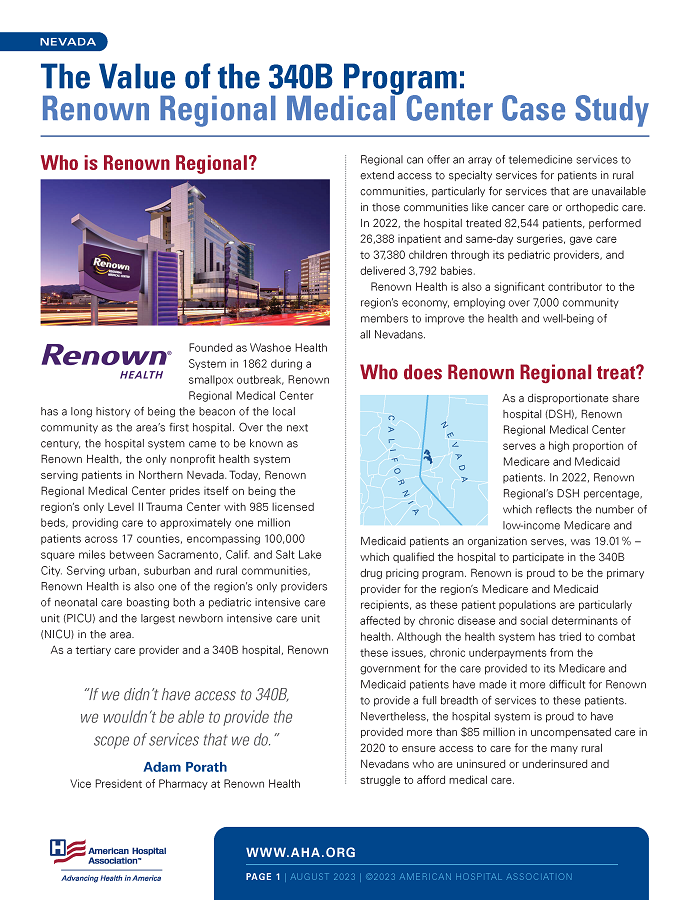

Renown Regional Medical Center | Nevada
The Value of the 340B Program Case Study
Who is Renown Regional?
 Founded as Washoe Health System in 1862 during a smallpox outbreak, Renown Regional Medical Center has a long history of being the beacon of the local community as the area’s first hospital. Over the next century, the hospital system came to be known as Renown Health, the only nonprofit health system serving patients in Northern Nevada. Today, Renown Regional Medical Center prides itself on being the region’s only Level II Trauma Center with 985 licensed beds, providing care to approximately one million patients across 17 counties, encompassing 100,000 square miles between Sacramento, Calif. and Salt Lake City. Serving urban, suburban and rural communities, Renown Health is also one of the region’s only providers of neonatal care boasting both a pediatric intensive care unit (PICU) and the largest newborn intensive care unit (NICU) in the area.
Founded as Washoe Health System in 1862 during a smallpox outbreak, Renown Regional Medical Center has a long history of being the beacon of the local community as the area’s first hospital. Over the next century, the hospital system came to be known as Renown Health, the only nonprofit health system serving patients in Northern Nevada. Today, Renown Regional Medical Center prides itself on being the region’s only Level II Trauma Center with 985 licensed beds, providing care to approximately one million patients across 17 counties, encompassing 100,000 square miles between Sacramento, Calif. and Salt Lake City. Serving urban, suburban and rural communities, Renown Health is also one of the region’s only providers of neonatal care boasting both a pediatric intensive care unit (PICU) and the largest newborn intensive care unit (NICU) in the area.
As a tertiary care provider and a 340B hospital, Renown Regional can offer an array of telemedicine services to extend access to specialty services for patients in rural communities, particularly for services that are unavailable in those communities like cancer care or orthopedic care. In 2022, the hospital treated 82,544 patients, performed 26,388 inpatient and same-day surgeries, gave care to 37,380 children through its pediatric providers, and delivered 3,792 babies.
Renown Health is also a significant contributor to the region’s economy, employing over 7,000 community members to improve the health and well-being of all Nevadans.
“If we didn’t have access to 340B, we wouldn’t be able to provide the scope of services that we do.”
Who does Renown Regional treat?
 As a disproportionate share hospital (DSH), Renown Regional Medical Center serves a high proportion of Medicare and Medicaid patients. In 2022, Renown Regional’s DSH percentage, which reflects the number of low-income Medicare and Medicaid patients an organization serves, was 19.01% – which qualified the hospital to participate in the 340B drug pricing program. Renown is proud to be the primary provider for the region’s Medicare and Medicaid recipients, as these patient populations are particularly affected by chronic disease and social determinants of health. Although the health system has tried to combat these issues, chronic underpayments from the government for the care provided to its Medicare and Medicaid patients have made it more difficult for Renown to provide a full breadth of services to these patients. Nevertheless, the hospital system is proud to have provided more than $85 million in uncompensated care in 2020 to ensure access to care for the many rural Nevadans who are uninsured or underinsured and struggle to afford medical care.
As a disproportionate share hospital (DSH), Renown Regional Medical Center serves a high proportion of Medicare and Medicaid patients. In 2022, Renown Regional’s DSH percentage, which reflects the number of low-income Medicare and Medicaid patients an organization serves, was 19.01% – which qualified the hospital to participate in the 340B drug pricing program. Renown is proud to be the primary provider for the region’s Medicare and Medicaid recipients, as these patient populations are particularly affected by chronic disease and social determinants of health. Although the health system has tried to combat these issues, chronic underpayments from the government for the care provided to its Medicare and Medicaid patients have made it more difficult for Renown to provide a full breadth of services to these patients. Nevertheless, the hospital system is proud to have provided more than $85 million in uncompensated care in 2020 to ensure access to care for the many rural Nevadans who are uninsured or underinsured and struggle to afford medical care.
What’s the value of the 340B program for Renown Regional and its patients?
As the only nonprofit health system in Northern Nevada, the 340B program is crucial to Renown’s success in providing comprehensive, quality care to all patients, regardless of their ability to pay. The organization’s 340B savings support many programs it could otherwise not be able to provide, such as:
Medicaid Clinic
The 340B program has enabled Renown Health to maintain an outpatient clinic for adult patients covered by Medicaid. Specifically, patients on Medicaid are referred to this location for follow-up services after an inpatient stay. If not for the Medicaid center, Renown Health would have to refer its Medicaid patients to two federally qualified health centers in Reno, both of which consistently experience capacity issues. The clinic has allowed Renown Health to ensure that Medicaid patients are receiving needed follow-up care closer to home, which ultimately reduces hospital readmission rates.
Meds-to-Beds Program
Renown Health has implemented a Meds-to-Beds Program, which offers bedside medication delivery to patients who are being discharged from the hospital and cannot afford their medications. This means that patients can choose to get access to the drugs they need hand-delivered to them and receive medication counseling if needed. For many patients, this program eases the stress that may come with a hospital discharge and the thought of having to purchase expensive medications that may be otherwise unaffordable.
Infusion Services
With the only pediatric oncology and hematology program in Northern Nevada, Renown Health sees many pediatric patients covered by Medicaid. It is only able to serve this high volume of patients because the 340B program helps offset the underpayments by Medicaid for these services. In addition, 340B has allowed Renown Health to retain staff and maintain an excellent standard of care when providing patients with inpatient chemotherapy and outpatient infusion services on-site. Through the system’s infusion services, these patients – along with adult patients living with cancer, rheumatoid arthritis and multiple sclerosis – can receive the lifesaving treatment they need.
340B Hospitals Need Support
The 340B program is a vital lifeline for hospitals like Renown Regional by supporting the critical health services that the organization provides to meet the unique needs of its patients. Unfortunately, repeated efforts to scale back the scope of the 340B program have already had a negative impact on Renown Health.
To reach patients across the 17-county area it serves, Renown Health works with a network of 83 contract pharmacies. However, recent restrictions imposed by major drug companies have severely limited the ability of hospitals like Renown Regional to establish contracts with local community and specialty pharmacies, undercutting patient access to affordable medications in the community. Additionally, manufacturer restrictions on the use of contract pharmacies have cost the hospital system $4 million annually, and one manufacturer’s decision to cut off sales of 340B products alone had a $500,000 impact on Renown Health. This means that access to the many services supported by the hospital’s 340B savings are in jeopardy.
To allow Renown Regional and other 340B hospitals to continue to quickly respond to patient and community needs, Congress must protect the 340B drug pricing program. Doing so will help ensure the continued well-being of millions of Americans who rely on the 340B program for affordable and accessible health care.


